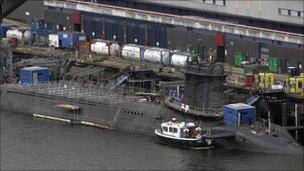Trident scale back urged amid cost worries
- Published

The so-called continuous-at-sea-deterrence has been the basis of UK strategy since 1968
The government should scale back the UK's Trident nuclear deterrent to save money, a think tank has said.
The Royal United Services Institute urged ministers to consider dropping the requirement of always having a nuclear submarine on patrol at sea.
Earlier this month, Defence Secretary Liam Fox said the four submarines could be cut to three.
The MoD said a review was under way but the government was committed to maintaining the nuclear deterrent.
The call from the Royal United Services Institute (RUSI) comes as the Ministry of Defence is having to contemplate cuts in its budget of between 10% and 20%.
Trident vessels currently provide a nuclear deterrent because the submarines, under the waves in secret locations, would be almost impossible to destroy in a pre-emptive strike.
Critics say Trident is too expensive, and there have been calls to either scrap the nuclear deterrent or switch to a cheaper land-based missile system.
'Significant savings'
The so-called continuous-at-sea-deterrence (CASD) has been the basis of Britain's strategic nuclear deterrent since the first Polaris submarines - the predecessor of Trident - were deployed in 1968.
But the RUSI paper, written by Professor Malcolm Chalmers - a former adviser to Jack Straw and Margaret Beckett when they were foreign secretaries - suggests CASD is no longer necessary following the end of the Cold War and abandoning it could produce "significant financial savings".
"There is now a stark gap between the assumptions on which planning for the UK's conventional and nuclear forces, respectively, are based," the paper said.

Dr Fox has said a decision about the fourth submarine would be made in 2014/2015
Dropping CASD would enable the government to delay ordering a replacement fleet of missile-carrying submarines, putting back the point where it would have to start paying out up to £1.5bn a year in construction costs, it argued.
The paper comes as Dr Fox is locked in a battle over whether the new submarines should be paid for from the MoD's core budget or whether - as in the past - they should be funded separately.
The government is carrying out a strategic defence review of the shape and size of the UK's armed forces, but said it would not be looking at whether to replace the ageing submarines.
But a MoD spokesman said it would be looking at whether the renewal of the deterrent provided "value for money".
"It will consider the programme timetable, numbers of submarines, missiles, missile tubes and warheads, infrastructure and other support costs, and the industrial supply chain," he said.
"Once the review has concluded, ministers will discuss and agree the optimum balance of capability and cost."
Earlier this month, Dr Fox told the Chatham House policy think tank in London that a decision about the fourth submarine would be made in 2014/2015.
In his Budget last month, Chancellor George Osborne said departments would face average cuts of 25% when the government's public spending review was completed in October - potentially bigger than anything attempted by a previous UK government.
Health and overseas aid spending will be ringfenced, while defence and education will face cuts of between 10% and 20%.
- Published13 July 2010
- Published13 July 2010
- Published21 June 2010